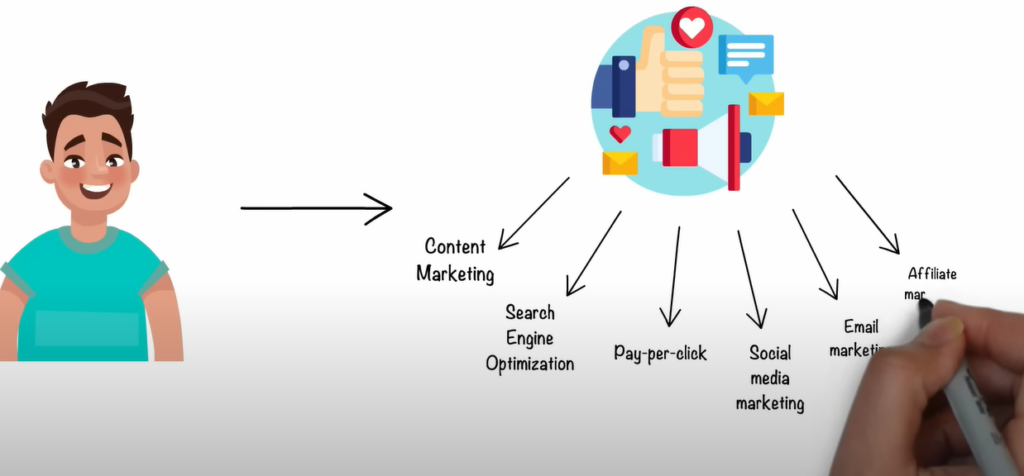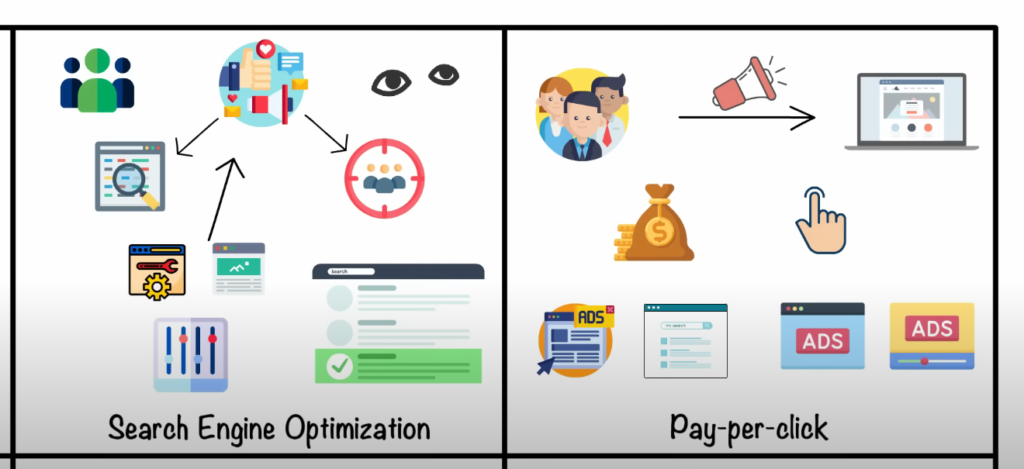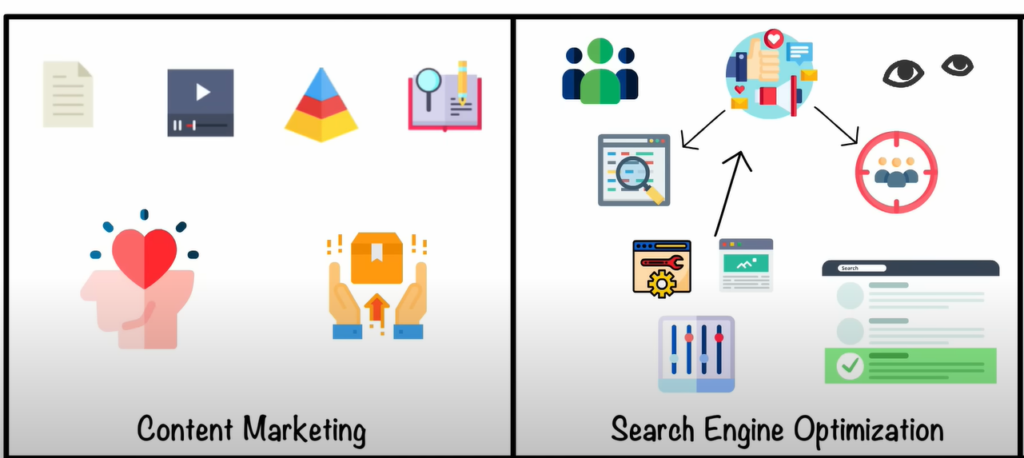Section 1: Understanding Digital Marketing and Its Importance
Introduction:
In today’s digital age, businesses of all sizes need to have a strong online presence to succeed. Digital marketing is the key to reaching your target audience, building brand awareness, and driving sales.

What is digital marketing?
Digital marketing is the use of digital channels, such as the internet, mobile devices, and social media, to promote products or services. It encompasses a wide range of activities, including:
- Search engine optimization (SEO)
- Search engine marketing (SEM)
- Social media marketing
- Content marketing
- Email marketing
- Affiliate marketing
- Influencer marketing
- Mobile marketing
Benefits of Digital Marketing:
Digital marketing offers a number of benefits for businesses, including:
- Increased reach: Digital marketing allows you to reach a wider audience than traditional marketing methods.
- Targeted advertising: Digital marketing allows you to target your advertising to specific demographics, interests, and behaviors.
- Cost-effectiveness: Digital marketing is often more cost-effective than traditional marketing methods.
- Measurable results: Digital marketing campaigns can be easily tracked and measured, so you can see what’s working and what’s not.
Types of digital marketing:
There are many different types of digital marketing, each with its own unique benefits and drawbacks. The most common types of digital marketing include:
- Search engine optimization (SEO): SEO is the process of optimizing your website and its content to rank higher in search engine results pages (SERPs).
- Search engine marketing (SEM): SEM is the process of paying for ads to appear in SERPs.
- Social media marketing: Social media marketing involves using social media platforms to connect with your target audience, build relationships, and promote your products or services.
- Content marketing: Content marketing involves creating and distributing valuable, relevant, and consistent content to attract and retain customers.
- Email marketing: Email marketing involves using email to nurture leads, build relationships, and promote products or services.
Search Engine Optimization (SEO)
Introduction:
Search engine optimization (SEO) is the process of optimizing your website and its content to rank higher in search engine results pages (SERPs). When people search for keywords related to your business, you want your website to appear as close to the top of the results as possible.
How SEO Works:
SEO works by sending signals to search engines, such as Google, about the relevance and authority of your website. These signals include:
- On-page SEO: This includes factors such as the content on your website, the structure of your website, and the keywords you use.
- Off-page SEO: This includes factors such as the number and quality of backlinks to your website.
Benefits of SEO:
SEO offers a number of benefits for businesses, including:
- Increased organic traffic: SEO can help you attract more organic traffic to your website, which can lead to more leads and sales.
- Improved brand awareness: A higher ranking in SERPs can help increase brand awareness and make it easier for people to find your business.
- Cost-effectiveness: SEO is a relatively cost-effective way to market your business online.
SEO Techniques:
There are a number of different SEO techniques that you can use to improve your ranking in SERPs, including:
- Keyword research: Identifying the keywords that your target audience is searching for is essential for SEO.
- Content optimization: Creating high-quality content that is relevant to your target audience and includes your target keywords is important for SEO.
- Link building: Acquiring backlinks from other websites is one of the most important factors in SEO.
- Technical SEO: Ensuring that your website is technically sound and easy for search engines to crawl and index is important for SEO.
Search Engine Marketing (SEM)
Introduction:
Search engine marketing (SEM) is the process of paying for ads to appear in search engine results pages (SERPs). SEM is a form of pay-per-click (PPC) advertising, which means that you only pay when someone clicks on your ad.
How SEM works:
When you create a SEM campaign, you choose the keywords that you want your ad to appear for. When someone searches for one of your keywords, your ad will appear in the SERPs. You can target your ads to specific demographics, interests, and behaviors.
Benefits of SEM:

SEM offers a number of benefits for businesses, including:
- Immediate results: SEM can help you get immediate results, as your ads will start appearing in SERPs as soon as your campaign is approved.
- Targeted advertising: SEM allows you to target your ads to specific demographics, interests, and behaviors.
- Measurable results: SEM campaigns can be easily tracked and measured, so you can see what’s working and what’s not.
Types of SEM ads:
There are two main types of SEM ads:
- Text ads: Text ads are the most common type of SEM ad. They appear in the SERPs as a line of text with a headline, description, and URL.
- Display ads: Display ads are visual ads that appear in the SERPs alongside text ads. Display ads can include images, videos, and interactive elements.
SEM Platforms:
The two largest SEM platforms are Google Ads and Microsoft Advertising. Google Ads is the most popular SEM platform, with over 90% of the market share.
Social Media Marketing
Introduction:

Social media marketing is the process of using social media platforms to connect with your target audience, build relationships, and promote your products or services. Social media marketing can be used to achieve a variety of business goals, such as:
- Increasing brand awareness
- Generating leads
- Driving sales
- Providing customer support
Benefits of Social Media Marketing:
Social media marketing offers a number of benefits for businesses, including:
- Reach: Social media platforms have a vast reach, with billions of active users worldwide.
- Targeting: Social media platforms allow you to target your marketing messages to specific demographics, interests, and behaviors.
- Engagement: Social media platforms are a great way to engage with your target audience and build relationships.
Social media platforms:
There are a number of different social media platforms that you can use for marketing, including:
- Facebook: Facebook is the largest social media platform, with over 2 billion active users.
- Instagram: Instagram is a photo and video sharing platform with over 1 billion active users.
- Twitter: Twitter is a microblogging platform with over 330 million active users.
- LinkedIn: LinkedIn is a professional networking site with over 830 million active users.
Social media marketing strategies:
There are a number of different social media marketing strategies that you can use to achieve your business goals. Some of the most common strategies include:
- Content marketing: Creating and sharing valuable, relevant, and consistent content is a great way to attract and engage your target audience.
- Social media advertising: Social media platforms offer a variety of advertising options that can help you reach a wider audience.
- Influencer marketing: Partnering with influencers in your industry can help you reach a larger audience and build trust.
- Community building: Building a strong community around your brand on social media can help you increase brand loyalty and generate leads.
Content Marketing
Introduction:

Content marketing is the process of creating and distributing valuable, relevant, and consistent content to attract and retain a clearly defined audience and drive profitable customer action. Content marketing is a long-term strategy that focuses on building a relationship with your target audience by providing them with valuable information.
Benefits of Content Marketing:
Content marketing offers a number of benefits for businesses, including:
- Increased brand awareness: Content marketing can help you increase brand awareness by getting your content in front of a wider audience.
- Generated leads: Content marketing can help you generate leads by providing valuable information to your target audience.
- Improved customer engagement: Content marketing can help you improve customer engagement by building relationships with your target audience.
- Increased sales: Content marketing can help you increase sales by providing valuable information to your target audience and building trust.
Types of Content Marketing:
There are many different types of content marketing, including:
- Blog posts: Blog posts are a great way to share your expertise and provide valuable information to your target audience.
- Articles: Articles are longer-form content that can provide in-depth information on a specific topic.
- Videos: Videos are a great way to engage your target audience and provide them with information in a visually appealing way.
- Infographics: Infographics are visual representations of data or information.
- eBook’s: eBooks are longer-form content that can provide in-depth information on a specific topic.
Content Marketing Strategies:
There are a number of different content marketing strategies that you can use to achieve your business goals. Some of the most common strategies include:
- Creating high-quality content: The most important aspect of content marketing is creating high-quality content that is valuable to your target audience.
- Promoting your content: Once you have created great content, you need to promote it so that your target audience can find it.
- Measuring your results: It is important to measure the results of your content marketing efforts so that you can see what is working and what is not.
Email Marketing
Introduction:
Email marketing is the process of using email to nurture leads, build relationships, and promote products or services. Email marketing is a powerful tool that can help you reach your target audience, build relationships, and drive sales.
Benefits of Email Marketing:
Email marketing offers a number of benefits for businesses, including:
- Reach: Email marketing has a vast reach, with over 4 billion people using email worldwide.
- Targeting: Email marketing allows you to target your messages to specific demographics, interests, and behaviors.
- Segmentation: You can segment your email list to send targeted messages to different groups of people.
- Personalization: Email marketing allows you to personalize your messages to each individual recipient.
- Automation: Email marketing can be automated, which can save you time and effort.
Types of email marketing:
There are many different types of email marketing, including:
- Newsletters: Newsletters are a great way to keep your subscribers updated on your latest news and events.
- Promotional emails: Promotional emails are used to promote products or services.
- Transactional emails: Transactional emails are triggered by a specific action, such as a purchase or a sign-up.
- Drip campaigns: Drip campaigns are a series of automated emails that are sent to subscribers over a period of time.
Email marketing strategies:
There are a number of different email marketing strategies that you can use to achieve your business goals. Some of the most common strategies include:
- Building an email list: The first step to email marketing is building an email list. You can do this by offering a lead magnet, such as a free eBook or a discount code.
- Creating high-quality content: The content of your emails is important. Make sure to create content that is valuable and engaging to your target audience.
- Segmenting your email list: Segmenting your email list allows you to send targeted messages to different groups of people.
- Personalizing your emails: Personalizing your emails makes them more relevant to each individual recipient.
- Automating your email marketing: Automating your email marketing can save you time and effort.
Affiliate Marketing
Introduction:
Affiliate marketing is a performance-based marketing strategy where businesses collaborate with affiliates to promote their products or services. Affiliates earn a commission for each sale or lead that they generate.
How Affiliate Marketing Works:
When a business signs up for an affiliate program, they provide their affiliates with a unique tracking link. When a customer clicks on the affiliate link and makes a purchase, the affiliate earns a commission.
Benefits of Affiliate Marketing:
Affiliate marketing offers a number of benefits for businesses, including:
- Increased reach: Affiliate marketing allows you to reach a wider audience by partnering with affiliates who have a following in your target market.
- Cost-effective: Affiliate marketing is a cost-effective way to market your products or services. You only pay affiliates when they generate sales or leads.
- Performance-based: Affiliate marketing is performance-based, which means that you only pay for results.
Types of affiliate marketing:
There are two main types of affiliate marketing:
- Single-tier affiliate marketing: In single-tier affiliate marketing, affiliates earn a commission for sales that they generate directly.
- Multi-tier affiliate marketing: In multi-tier affiliate marketing, affiliates can also earn commissions on sales that are generated by their referrals.
Affiliate Marketing Strategies:
There are a number of different affiliate marketing strategies that you can use to achieve your business goals. Some of the most common strategies include:
- Building relationships: Building relationships with your affiliates is important for long-term success.
- Providing high-quality products or services: Offering high-quality products or services is essential for attracting and retaining affiliates.
- Creating effective marketing materials: Creating effective marketing materials that affiliates can use to promote your products or services is important.
- Tracking your results: Tracking the results of your affiliate marketing campaigns is important so that you can see what is working and what is not.
Influencer Marketing
Introduction:
Influencer marketing is a strategy that involves partnering with influential individuals in a specific niche to promote products or services. Influencer marketing can be a powerful tool for reaching your target audience, building trust, and driving sales.
How Influencer Marketing Works:
When you partner with an influencer, you are essentially paying them to promote your products or services to their followers. Influencers can promote your products or services in a variety of ways, such as:
- Creating sponsored posts: Sponsored posts are posts that influencers create and publish on their social media channels. These posts typically include a photo or video of the product or service, along with a caption that describes the product or service and encourages followers to purchase it.
- Hosting giveaways: Influencers can host giveaways of your products or services to their followers. This is a great way to generate excitement and buzz around your brand.
- Creating product reviews: Influencers can create product reviews of your products or services. These reviews can be very influential, as they provide potential customers with an unbiased opinion of your products or services.
Benefits of Influencer Marketing:
Influencer marketing offers a number of benefits for businesses, including:
- Increased reach: Influencer marketing allows you to reach a wider audience by partnering with influencers who have a following in your target market.
- Enhanced credibility: Influencers have built trust with their followers, so partnering with them can help you enhance the credibility of your brand.
- Increased sales: Influencer marketing can help you increase sales by driving traffic to your website and generating leads.
How to Choose the Right Influencers:
When choosing influencers to partner with, it is important to consider the following factors:
- Relevance: The influencer’s niche should be relevant to your target audience.
- Reach: The influencer should have a large enough following to reach your target audience.
- Engagement: The influencer should have a high level of engagement with their followers.
- Authenticity: The influencer should be authentic and genuine in their recommendations.
Conclusion:
Digital marketing is a complex and ever-changing field, but it is essential for any business that wants to succeed online. By understanding the different types of digital marketing and how to use them effectively, you can reach your target audience, build brand awareness, and drive sales.
